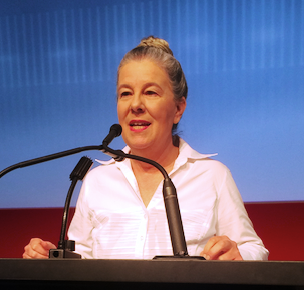- Home
- About Us
- The Team / Contact Us
- Books and Resources
- Privacy Policy
- Nonprofit Employer of Choice Award

 I am a child of the 60s. Literally. I was born in the 1960s. When I was growing up, my doctor, dentist, school principals, local police force, local fire fighters, television news anchors, and City Council member were all white men. To this day, the default picture in my head of "leader" is a white guy in his 50s. I know other people can be leaders. That white guy image is the picture I grew up with and it still lives in my head.
I am a child of the 60s. Literally. I was born in the 1960s. When I was growing up, my doctor, dentist, school principals, local police force, local fire fighters, television news anchors, and City Council member were all white men. To this day, the default picture in my head of "leader" is a white guy in his 50s. I know other people can be leaders. That white guy image is the picture I grew up with and it still lives in my head.
In recent weeks, we have been seeing two white male leaders in the news, Craig and Mark Kielburger, founders of the WE Charity empire. And what we have also seen is the huge benefit of the doubt that they have been given. That benefit started at the very beginning of WE's founding as Hawa Y. Mire pointed out in her excellent analysis "Canada should give Black communities $450 million — not the Kielburgers." Mire notes how the positive assumptions about two young white men catapulted them into leadership.
WE is a distinctly white scandal. If the major actors were Black or Indigenous, this story would not have become a long-time headline grabber. We assume that white male leaders are innocent until proven guilty. But what about the reverse? I feel certain that if the Kiehlburgers had been Black or Indigenous, the press would have been quick to assume they were guilty.
Why do I assume that a Black or Indigenous leader would have been judged quickly and harshly? There is a concept of "backstage conversation" I recently learned which says that how white people talk about people of other races in private with other white people is very different than how we do in public. While racism is still socially unacceptable "front stage" when speaking in public, the research shows that racism is alive and well in white conversations "backstage" when no one else can hear us talking.
What does this have to do with the charity sector? I will tell you I have heard white people talk regularly backstage that they believe that Black-run charities are poorly financially managed, that the leadership of Indigenous charities is filled with the family and friends of the charity CEO.
When the Kielburgers built a complex structure that includes a business forking all kinds of money between charity and for profit arms, charity leaders weren't impressed by them but I never heard anyone talk about this is terms of white privilege. That messiness included a complete lack of transparency about their own salaries which was accepted in the public as a great example of entrepreneurship. When the brothers developed a charity empire, starting with their parents, hiring their wives, and with themselves at the helm, no one ever accused them of nepotism. Instead they were heralded as a great example of a close family working towards a common goal.
My point is the other side of Mire's. Behind the scenes, the largely white charity sector has set up people like the Kielburgers for success and Black and Indigenous leaders for failure. In a sector that is upwards of 70% white but where leadership is even more disproportionately white, it appears that we are continuing to replicate the images of childhood - white men in charge.
To be fair, there are plenty of great white male leaders. And there are plenty of white people who are genuine and hard-working allies to the Black and Indigenous communities. But the rest of us need to start matching our actions and words with our ideals. Not speaking up in conversations that are consciously or unconsciously racist where you are present is to leave much of the work of building equity largely undone.
I was a kid a long time ago. Just as we no longer use typewriters, rotary telephones, or mimeo machines, the time is long overdue for us to update our image of who is a leader in our mind. We need to support all leaders of quality with our words, public and private. This is one of the ways we can make sure that the best leaders lead our charities to build a Canada that is good for all.
Ann Rosenfield is the Editor of Hilborn Charity eNews.
Image by Rebrand via Pexels